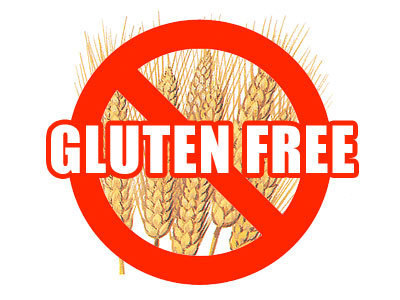Many of you have heard of a “gluten-free” diet. I’ll guarantee one of your friends is actually on a gluten-free diet. I’ll also guarantee that your friend on a gluten-free diet probably has no great reason to be on said gluten-free diet.
Have you ever asked your friend if they know what gluten is? Here is a list of questions you may ask, and their potential answers:
Your friend doesn’t know their elbow from their ear about why they’ve lost weight or why they’ve gone gluten free.
Doctors will tell you two reasons to adopt this eating style.
1. You have Celiac Disease.
2. You have a gluten-sensitivity.
Most individuals with Celiac Disease have done a great job of getting tested and diagnosed. Their symptoms are usually pronounced and start early in life. Because it’s a genetic auto-immune disease, sufferers not only experience gastric discomfort, but have a weaker immune system while they’re fighting the gluten allergy. Sufferers of Celiac Disease undergo extremely stressful small-intestine inflammation when their bodies are influenced by gluten. To rectify this issue, they adopt dietary changes that reflect what their bodies can process.
This is a viable reason to go gluten-free.
But as you may have guessed, many people “enjoying” a gluten-free diet are self-diagnosed. I will wager (and again, opinions are like what?) they didn’t have an issue until the idea was given to them that they could potentially have one. Being bloated, sluggish, having bowel movement trouble, or having excess weight-gain give lots of individuals the idea they may have “gluten sensitivity.” This is a blanket statement. Being self-diagnosed is as effective as calling a plumber to fix your roof.
Many reasons why your friend has made positive progress by adopting gluten-free options is because, wait for it…
They stopped eating shit.
Many of the foods one would enjoy that contain gluten are pretty terrible towards maintaining a constructive diet. Breads, cereals, crackers… pretty much anything processed that contains wheat. This includes whole-grain alternatives.
When your diet contains less whole-food than processed food, you will have excess weight gain and feel like crap. These foods are quite easy to overeat, which contributes to excess calorie intake, spiked insulin levels, and- you guessed it- being bloated.
The symptoms your friend diagnosed themselves with were actually the symptoms of eating crap and feeling like crap.
Now on a serious note, if you do feel concerned you are gluten sensitive or are just now figuring out you have Celiac Disease, go to this link and learn options for assuaging your concerns:
http://www.celiaccentral.org/celiac-disease/facts-and-figures/
Some key points are,
1. An estimated 1 in 133 Americans, or about 1 percent of the population, has celiac disease.
2. It is estimated that 83% of Americans who have Celiac Disease are undiagnosed or misdiagnosed with other conditions (one of which being IBS)
3. 5-22% of celiac patients have an immediate family member who has celiac. (Meaning it’s heavily linked to genetics. If you’re the first person in your family to think you have this problem, you most certainly are probably not suffering from it.)
4. As of today, the only existing treatment for celiac sufferers is going 100% gluten free. (So if it’s just a fad for your friend, picking and choosing when to be gluten free is also wasting their time.)
To summarize? Go get diagnosed for IBS or Celiac disease. If you’re in your 20’s and all of a sudden think you are gluten sensitive, it’s probably fictional and you should clean up your diet. If you’re the first person in your family to think you have this problem, it’s probably fictional and you should clean up your diet. If you’ve lost weight by going gluten-free, it’s probably because you cleaned up your diet. If your digestive system feels healthier since trying gluten-free, it’s probably because you cleaned up your diet. If going gluten-free is the only way to clean up your diet, fine. The more money you spend on gluten-free products, the easier it is for people with celiac disease to find more enjoyable options. And oh, be prepared to actually acquire gluten sensitivity when you eliminate it from your diet, and have nutrient deficiencies of Iron, Folic Acid, Fiber, Calcium, and Vitamins A, D, E, K.
Have you ever asked your friend if they know what gluten is? Here is a list of questions you may ask, and their potential answers:
- Do you have Celiac Disease?
- Do you know what gluten is?
- Do you know what gluten-containing products are in the food you were eating?
- Do you know why you’ve lost weight by going gluten-free?
- Do you have Celiac Disease?
Your friend doesn’t know their elbow from their ear about why they’ve lost weight or why they’ve gone gluten free.
Doctors will tell you two reasons to adopt this eating style.
1. You have Celiac Disease.
2. You have a gluten-sensitivity.
Most individuals with Celiac Disease have done a great job of getting tested and diagnosed. Their symptoms are usually pronounced and start early in life. Because it’s a genetic auto-immune disease, sufferers not only experience gastric discomfort, but have a weaker immune system while they’re fighting the gluten allergy. Sufferers of Celiac Disease undergo extremely stressful small-intestine inflammation when their bodies are influenced by gluten. To rectify this issue, they adopt dietary changes that reflect what their bodies can process.
This is a viable reason to go gluten-free.
But as you may have guessed, many people “enjoying” a gluten-free diet are self-diagnosed. I will wager (and again, opinions are like what?) they didn’t have an issue until the idea was given to them that they could potentially have one. Being bloated, sluggish, having bowel movement trouble, or having excess weight-gain give lots of individuals the idea they may have “gluten sensitivity.” This is a blanket statement. Being self-diagnosed is as effective as calling a plumber to fix your roof.
Many reasons why your friend has made positive progress by adopting gluten-free options is because, wait for it…
They stopped eating shit.
Many of the foods one would enjoy that contain gluten are pretty terrible towards maintaining a constructive diet. Breads, cereals, crackers… pretty much anything processed that contains wheat. This includes whole-grain alternatives.
When your diet contains less whole-food than processed food, you will have excess weight gain and feel like crap. These foods are quite easy to overeat, which contributes to excess calorie intake, spiked insulin levels, and- you guessed it- being bloated.
The symptoms your friend diagnosed themselves with were actually the symptoms of eating crap and feeling like crap.
Now on a serious note, if you do feel concerned you are gluten sensitive or are just now figuring out you have Celiac Disease, go to this link and learn options for assuaging your concerns:
http://www.celiaccentral.org/celiac-disease/facts-and-figures/
Some key points are,
1. An estimated 1 in 133 Americans, or about 1 percent of the population, has celiac disease.
2. It is estimated that 83% of Americans who have Celiac Disease are undiagnosed or misdiagnosed with other conditions (one of which being IBS)
3. 5-22% of celiac patients have an immediate family member who has celiac. (Meaning it’s heavily linked to genetics. If you’re the first person in your family to think you have this problem, you most certainly are probably not suffering from it.)
4. As of today, the only existing treatment for celiac sufferers is going 100% gluten free. (So if it’s just a fad for your friend, picking and choosing when to be gluten free is also wasting their time.)
To summarize? Go get diagnosed for IBS or Celiac disease. If you’re in your 20’s and all of a sudden think you are gluten sensitive, it’s probably fictional and you should clean up your diet. If you’re the first person in your family to think you have this problem, it’s probably fictional and you should clean up your diet. If you’ve lost weight by going gluten-free, it’s probably because you cleaned up your diet. If your digestive system feels healthier since trying gluten-free, it’s probably because you cleaned up your diet. If going gluten-free is the only way to clean up your diet, fine. The more money you spend on gluten-free products, the easier it is for people with celiac disease to find more enjoyable options. And oh, be prepared to actually acquire gluten sensitivity when you eliminate it from your diet, and have nutrient deficiencies of Iron, Folic Acid, Fiber, Calcium, and Vitamins A, D, E, K.




 RSS Feed
RSS Feed
